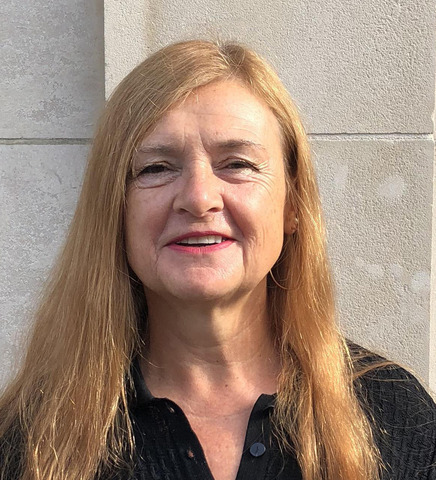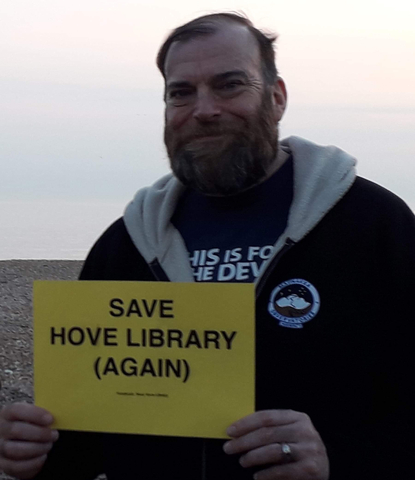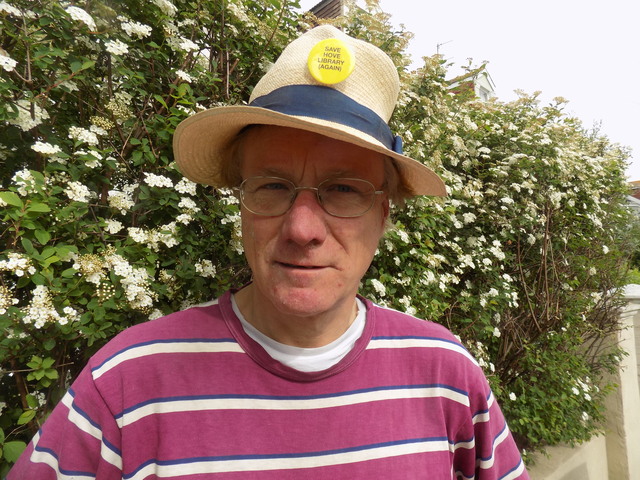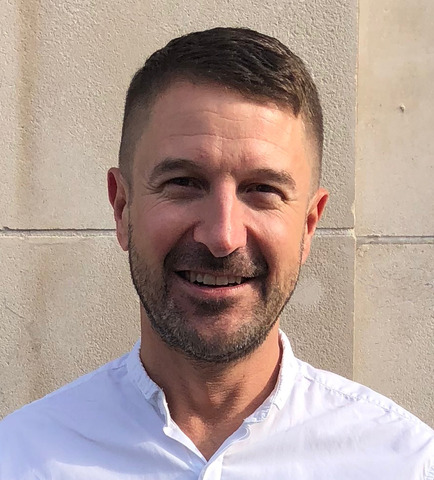Westbourne candidates explain why they want to be a councillor. They also answer questions sent in by the public via social media.
Not your ward? Click here to find your neighbourhood on our interactive map.
Ten candidates are standing for the two Brighton and Hove City Council seats in the Hove ward of Westbourne.
Carmen Gisela Appich is a retired accountant standing for Labour.

I have recently retired from a career in public service.
A qualified public sector accountant, I worked for over 25 years in local government, and six years in further education.
Geoff Date is a semi-retired accountant standing for the Liberal Democrats.

I want to be able to say at the end of my term of office, I made a difference for the better to the lives of those who live in Brighton and Hove.
John Guy Davidson is a computer programmer standing for the Greens.

I have lived in Brighton and Hove since I came to Sussex University in 1987.
It is a great place to live and I want to do good things for the city.
Hilary Susan Ellis is a professional leadership and career coach and trustee of Brighton-based adult education charity the Friends Centre. She is standing for the Liberal Democrats.

We live in a dynamic, diverse and vibrant city – and I want to ensure that all our residents can enjoy its benefits.
Years of cuts to local council budgets present a huge challenge, and I want to ensure that our Brighton and Hove City Council focuses spending and investment on what is most important: from affordable housing to better recycling, from adult education and social care to investment in our schools and children/young people’s services.
Christopher Hawtree is a writer standing for the Greens.

Having previously topped the poll, I learnt much about the many matters – life’s range – which occupy a council.
At its best, this can be stimulating to a purpose.
Meanwhile, I have given much time to a campaign to stop Labour again trying to close down Hove Library.
The support shown by thousands of people has been heartening, and if elected I should ensure that the imminent, worrying Libraries Plan is brought properly to the public and councillors, not slipped through.
I am chuffed that Salman Rushdie called me “excellently witty” – good humour eases fraught times (and meetings).
Chris Henry is a former teacher, now a party campaigner standing for Labour.

I taught English at PACA for 10 years and now work for Peter Kyle MP .
I has ran both of Peter’s hugely successful general election campaigns as well as work in the community to make Hove and Portslade a better place.
Charlie Nicholls is an investment manager standing for the Conservatives.
I want to be a councillor because I want to make a positive difference to the area that I live.
I run my own business so I am used to hard work and getting things done.
I watch with frustration as the current Labour administration neglects the area, mismanages projects and fails to implement sensible policies to benefit the local residents.
Our area has so much potential and I want to bring that potential to reality.
Denise Lorraine Cobb is standing for re-election for the Conservatives.
Robert Harding is standing for the UK Independence Party.
What are you views on the design and impact on traffic of the Valley Gardens phase 3 project in Old Steine which includes making Madeira Drive one-way by the Palace Pier?
Carmen Appich and Chris Henry: The designs are currently being drawn up to a detailed design stage.
Geoff Date and Hilary Ellis: All comments and issues raised are being addressed and we hope to see a detailed scheme which meets the needs of all residents and businesses/ visitors expected.
Those detailed designs will have to ensure that the city keeps moving while addressing the impacts of the climate change emergency and supporting a modern city where sustainable transport routes are protected and enhanced.
We welcome the uninterrupted green space on the western side but we’re concerned about the excessive width of the one-way street (in terms of pedestrian safety) and the possibility of the scheme worsening congestion.
Pollution from traffic congestion is proven to damage people’s health, and causing life-threatening asthma in our children.
Traffic schemes that can maintain a flow of traffic help to reduce this and we’re unconvinced this scheme does that.
There was too little consultation on this scheme so we’re concerned about the process of the project as well.
John Davidson and Christopher Hawtree: This has been in progress for 13 years.
The area has become a series of unappetising traffic islands rather than one in which people used to stroll and talk.
The improvements will also make St James’s Street and North Street a more coherent area rather than isolated from each other, and the plan will gain from swiftly-advancing auto-mobile technology such as electric engines and driverless vehicles.
There is a huge problem with dog owners leaving waste behind, either in bags or just out in the open in parks and street. What will you do to tackle dog owners not picking up poo?
Carmen Appich and Chris Henry: Our new enforcement officers who have been brought in-house are out and about in neighbourhoods, and targeting those whose antisocial behaviours are affecting all our lives.
We need to both educate and enforce our way out of this problem, and we want that message to get through to all who chose to leave dog mess across our city.
Geoff Date and Hilary Ellis: Dog owners who do not clean up their dog’s poo and bin it should be fined £50 under existing regulations.
More dog poo bins with bio-degradable bags are needed and we think reminders painted onto pavements could be trialled to see if that makes a difference.
We would also consult with a wide range of dog owners to find out why some dog owners don’t clean up and see what ideas and recommendations they have on how to tackle the problem.
Christopher Hawtree: I should like more details of this problem.
Certainly I see more people cleaning up after their dogs’ natural function than in the past.
Where a problem is established, a well-publicised team can be set to patrol the area.
Dogs are a joy: one can never be miserable in their company.
I compiled a large book about dogs: Andy Warhol lamented his dog using his shower to relieve himself.
Charlie Nicholls: This is widespread problem that is a concern to a lot of residents. The solution is two-fold: deterrence and detection.
The best way to prevent dog mess is to ensure that people are educated and encouraged to clear it up so that it never appears in the first place.
The second phase would to be have stricter on the spot fines for those who fail to do so.
The council is planning to roll out the installation of electric charging points. To what extent do you support this and will you commit to making these electric vehicle only parking spaces?
Carmen Appich and Chris Henry: We fully support the installation of electric vehicle charging points (EVCPs), and in fact it is the Labour council that successfully bid for £300,000 funding from the government to allow the installation of 200 EVCPs.
Test sites are already in operation.
It was noted at committee last June that the scheme might need to allow for mandatory parking bays for electric vehicle charging in the event, for example, it becomes clear that electric vehicle owners are having problems accessing advisory bays, or to adapting over time to increased demand.
Geoff Date and Hilary Ellis: The introduction of electric vehicles is so far limited, but clearly accessible, dedicated charging points are needed as their numbers increase.
We would consult with the motor industry and motor retailers to understand anticipated numbers so that the installation of charging points is aligned to demand.
As with the city-wide bicycles, private sector sponsorship / investment could help to fund them.
Over time we would like to see the city centre becoming an electric vehicle only zone – with a permanent park and ride on the outskirts of the city centre for non-electric vehicles.
Christopher Hawtree: Happily, the need for these is increasing, and systems are changing with the technology and national legislation.
Each one costs up to £10,000 to install: the positioning – preferably on the road itself – has to be well considered.
I am excited by the imminent advance in solar roof tiles: these will be as cheap to install as regular concrete tiles; as such, many people will be able to run their auto-mobiles for free.
Indeed, auto-mobiles would have been electric from the start but for Rockefeller leaning upon Henry Ford to use oil in which he had a business interest – the consequences of which we are now facing.
Charlie Nicholls: I am strongly in favour of this. We can all see the global move to electric vehicles, but this will only progress in Brighton if we have the infrastructure to support it.
Most residents in my ward to not have off street parking so these publicly available points are vital.
It would make sense and further encourage usage to make parking near these points electric only.
If you design with children in mind you also make it good for older people and create a healthier and more inclusive place that everyone can enjoy. How are you going to make the city safe and attractive for children to move around independently?
Carmen Appich and Chris Henry: We need a range of measures to be delivered across the whole city – better protected cycling and walking routes are key to this as well as a safe reliable public transport system.
We are also committed to setting up a fund to support improved community safety and neighbourhood policing measures to give people confidence in the safety and responsiveness of their local communities.
Geoff Date and Hilary Ellis: Reduced bus fares for the U16s, whether accompanied or not.
Also uneven pavements in many areas of Brighton and Hove present an everyday hazard to both young children, mothers pushing prams and pushchairs as well as adults with reduce mobility.
We would seek expert advice on how tree roots pushing up through pavements might be removed without damaging the trees themselves or being too costly.
We also want to see better enforcement of 20 mph speed limit in residential areas and outside schools, community centres and near local shops.
John Davidson and Christopher Hawtree: This must certainly be encouraged. It is best when natural rather than organised.
Play, and with it laughter, is vital to the growth of the confidence necessary to sustain relationships in all their forms throughout life, something not fostered by seclusion with a screen.
The imagination is a necessary part of success in life.
Charlie Nicholls: A focus on safety. Parents needs to feel that their children are safe to act independently in the ward.
We need more police officers walking the streets to create a safer atmosphere.
Equally, we need to ensure that the roads are safe, and crossings are unobstructed by bins so that we can avoid and any all road traffic accidents too.
Children with special education needs and disabilities and/or mental health problems need a champion on the city council. How interested and passionate are you about supporting parents and young people who struggle to be heard?
Carmen Appich and Chris Henry: We are committed to ensuring that the most disadvantaged and marginalised in our communities are given the support and services that enable them to play their fullest part in the life of the city, and reach their maximum potential.
Geoff Date and Hilary Ellis: With all the pressures on children, teenagers and their parents today it is vital that the needs of children and young people with special educational needs, disabilities and/or mental health problems are properly supported.
We would consult young people and their families and have the council work with the NHS and the not-for-profit sector to implement a “joined-up” response and support additional schools funding for special educational needs assistants.
Christopher Hawtree: This is vital to a fully-functioning society.
Along the way, in going from door to door, I have begun to help a disabled mother in her appeal for a Blue Badge necessary in driving with her son who has Downs Syndrome.
We need to stress the human factor rather than be subjected to points-based bureaucracy and curt letters.
Charlie Nicholls: We all understand that life for people with disabilities is difficult.
I want to make sure that we do everything we can to relive those difficulties and support both the individuals and their families.
The Jewish community would like to know if the candidates support and would uphold the Council’s adoption of the IHRA definition on antisemitism?
Carmen Appich and Chris Henry: The Labour Party and our city council administration is fully committed to the IHRA definition, and to tackling and rooting out antisemitism across the city.
There is no place for hate speech in this tolerant city, and those who think that free speech means freedom to use hate speech will never be tolerated.
Geoff Date and Hilary Ellis: Yes.
Christopher Hawtree: I am pleased that the Green councillors recently voted in favour of the adoption of the IHRA definition.
All such measures to prevent anti-Semitism must be taken. I recently wrote about Claude Lanzman, whose remarkable, long documentary Shoah documents, with survivors from both sides, the killing of Jewish people in Germany and elsewhere. I urge everybody to watch this.
Of course, we must also recognise concerns regarding the incorrect application of the IHRA to close down debate on Israeli Government policy.
However, the Green councillors do not view Green Party policy on the State of Israel as in conflict with the IHRA.
Charlie Nicholls: This is a very simple answer and should be for all of us. I support upholding the IHRA definition on antisemitism entirely.








